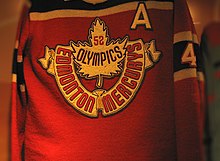The men's ice hockey tournament at the 1948 Winter Olympics in St. Moritz, Switzerland, was the sixth Olympic Championship, also served as the 15th World Championships and the 26th European Championships. Canada won its fifth Olympic gold medal and 12th World Championship, represented by the Ottawa RCAF Flyers team of Canadian Armed Forces personnel. The highest-finishing European team Czechoslovakia, won the silver medal and its eighth European Championship. Bibi Torriani played for Switzerland which won the bronze medal, and became the first ice hockey player to recite the Olympic Oath on behalf of all athletes.

The men's ice hockey tournament at the 1952 Winter Olympics in Oslo, Norway, was the seventh Olympic Championship, also serving as the 19th World Championships and the 30th European Championships. The tournament was mainly played at the Jordal Amfi Arena, as well as the stadiums at Dælenenga, Kadettangen (Sandvika), Marienlyst (Drammen) and Lillestrøm (Lillestrøm). Canada, represented by the Edmonton Mercurys, won its sixth Olympic gold medal and 15th World Championship. Highest finishing European team Sweden won the bronze medal and its sixth European Championship.
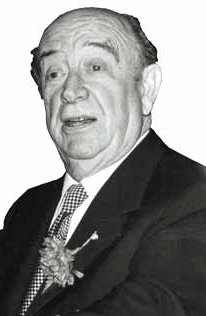
John Francis "Bunny" Ahearne was a British ice hockey administrator and businessman. He served rotating terms as president and vice-president of the International Ice Hockey Federation (IIHF) from 1951 to 1975, and was the secretary of the British Ice Hockey Association from 1934 to 1971, and later its president until 1982. He began in hockey by managing the last Great Britain team to win a gold medal at the Winter Olympic Games, before moving to the international stage. He implemented business reforms at the IIHF, oversaw the growth of ice hockey to new countries, and expanded the Ice Hockey World Championships. He was inducted into both the Hockey Hall of Fame and the British Ice Hockey Hall of Fame during his lifetime and was posthumously inducted into the IIHF Hall of Fame.

Donald Stewart Johnson was a Canadian sports executive. He was elected president of the Newfoundland Amateur Hockey Association (NAHA) in 1966, sought to expand minor ice hockey in Newfoundland and negotiated for the NAHA to become a member of the Canadian Amateur Hockey Association (CAHA). He was elected president of the CAHA in 1975, resolved internal disagreement over the jurisdiction of junior ice hockey, avoided the withdrawal of the Western Canada Hockey League and sought a new professional-amateur agreement with the National Hockey League and World Hockey Association. He was part of negotiations to end the Canada men's national ice hockey team hiatus from the Ice Hockey World Championships and the Olympic Games, in exchange for International Ice Hockey Federation approval of the 1976 Canada Cup. He established a long-term sponsorship to improve the National Coaching Certification Program, twice visited China with a Canadian amateur team for instructional tours and arranged an exchange for Chinese players and coaches to attend training camps in Canada. He was chairman of the 1978 World Junior Ice Hockey Championships as the CAHA past-president, and was posthumously credited by Hockey Canada for playing an important role in Canada's return to international competitions and improving Canada's hockey reputation.
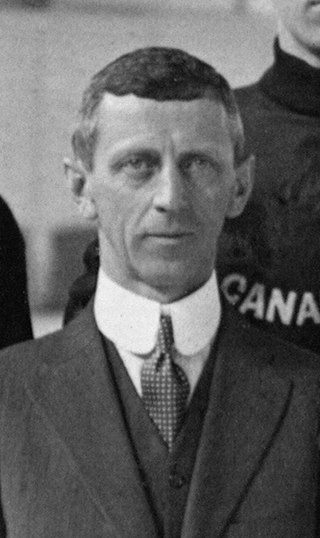
William Abraham Hewitt was a Canadian sports executive and journalist, also widely known as Billy Hewitt. He was secretary of the Ontario Hockey Association (OHA) from 1903 to 1966, and sports editor of the Toronto Daily Star from 1900 to 1931. He promoted the establishment of the Canadian Amateur Hockey Association (CAHA), then served as its secretary-treasurer from 1915 to 1919, registrar from 1921 to 1925, registrar-treasurer from 1925 to 1961, and a trustee of the Allan Cup and Memorial Cup. Hewitt standardized player registrations in Canada, was a committee member to discuss professional-amateur agreements with the National Hockey League, and negotiated working agreements with amateur hockey governing bodies in the United States. He oversaw referees within the OHA, and negotiated common rules of play for amateur and professional leagues as chairman of the CAHA rules committee. After retiring from journalism, he was the managing-director of Maple Leaf Gardens from 1931 to 1948, and chairman of the committee to select the inaugural members of the Hockey Hall of Fame in 1945.

George Samuel Dudley was a Canadian ice hockey administrator. He joined the Ontario Hockey Association (OHA) executive in 1928, served as its president from 1934 to 1936, and as its treasurer from 1936 to 1960. He was elected to Canadian Amateur Hockey Association (CAHA) executive in 1936, served as its president from 1940 to 1942, as its secretary from 1945 to 1947, and as its secretary-manager from 1947 to 1960. He was secretary of the International Ice Hockey Association from 1945 to 1947, and was later vice-president of the International Ice Hockey Federation (IIHF) from 1957 to 1960. He was expected to become the next president of the IIHF before his death. He graduated from Osgoode Hall Law School in 1917 then practiced law for 43 years as the town solicitor for Midland, Ontario.
The Port Arthur Bearcats were a senior amateur ice hockey team based in Port Arthur, Ontario, Canada – now part of the city of Thunder Bay – from the early 1900s until 1970. Before settling on the nickname of Bearcats, the Port Arthur team played several seasons with unofficial generic names applied by fans and sportswriters, such as the Port Arthur Ports, Port Arthur Hockey Club, and the Port Arthur Seniors.

Gordon Wainwright Juckes was a Canadian ice hockey administrator. He served as the president and later the executive director of the Canadian Amateur Hockey Association (CAHA), and as a council member of the International Ice Hockey Federation. Juckes became involved in hockey as newspaper publisher and team president, then served as president of the Saskatchewan Amateur Hockey Association. During World War II he was a Major in the Royal Canadian Artillery, and was honoured with the Order of the British Empire.

Allan Wilfrid Pickard was a Canadian ice hockey administrator, who served as president of the Canadian Amateur Hockey Association (CAHA) from 1947 to 1950. When Canada opted out of the 1947 Ice Hockey World Championships and decided not to participate in the 1948 Winter Olympics, Pickard felt that Canada was obliged to send a team due to its place as a top hockey nation, and nominated the Ottawa RCAF Flyers who won the gold medal for Canada and lived up to the requirements of the Olympic Oath as amateurs. Despite disagreement with the International Olympic Committee, he sought for the International Ice Hockey Federation to adopt the CAHA definition of amateur in the face of increasing difficulty in selecting the Canada men's national ice hockey team.

Paul Loicq was a Belgian lawyer, businessman and ice hockey player, coach, referee and administrator. He played ice hockey for Belgium men's national ice hockey team and won four bronze medals from in 1910 to 1914. He was a leading supporter of the efforts to introduce ice hockey at the Olympic Games, and served on the organizing committee for ice hockey at the 1920 Summer Olympics. After playing in the 1920 Olympics he served as president of the Royal Belgian Ice Hockey Federation from 1920 to 1935, and as president of the Ligue Internationale de Hockey sur Glace (LIHG) from 1922 to 1947, which was later known as the International Ice Hockey Federation (IIHF). During his time as president the LIHG more than doubled its membership and welcomed the first national associations from Asia and Africa, and the LIHG began hosting its annual Ice Hockey World Championships in 1930. He was also an international ice hockey referee from 1924 to 1937 at the Olympic Games, the Ice Hockey World Championships and the Ice Hockey European Championships. He served in the Belgian Army during World War I and World War II, achieved the rank of colonel, and represented Belgium as legal counsel at the Nuremberg trials.
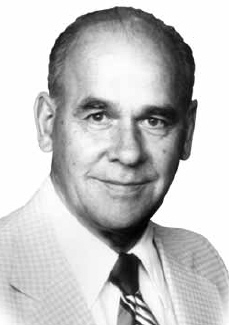
Frederick Page was a Canadian ice hockey administrator and ice hockey referee. He originated from Port Arthur, Ontario, where he played junior ice hockey, refereed locally and later at the Memorial Cup and Allan Cup competitions. He was a league executive in Fort William, then served as president of the Thunder Bay Amateur Hockey Association from 1958 to 1962. He was elected second vice president of the Canadian Amateur Hockey Association (CAHA) in 1962, and rose up the ranks to be its president from 1966 to 1968. Page wanted the CAHA to gain more control over its affairs, and become less dependent on the National Hockey League (NHL). Under his leadership, the NHL ended direct sponsorship of junior hockey teams. He was instrumental in negotiating the revised agreement for the NHL Amateur Draft in 1967, and later served as co-chairman of the resulting joint player development committee.
Billie Dawe was a Canadian amateur ice hockey player. He was a member of the 1950 World Champion team, the Edmonton Mercurys, and captained that team to a gold medal at the 1952 Winter Olympics.
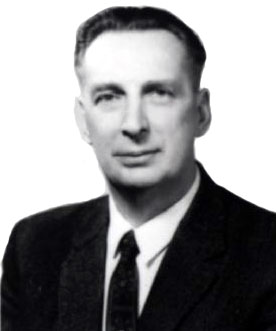
Hanson Taylor Dowell was a Canadian ice hockey administrator and politician. He served as president of the Canadian Amateur Hockey Association from 1945 to 1947, and was the first person from the Maritimes to serve on the national executive. He sought to have the Canadian definition of amateur recognized at the World Championships and the Olympic Games for the benefit of Canada's national team, and negotiated the merger of the International Ice Hockey Association into the Ligue Internationale de Hockey sur Glace. He served as president of the Maritime Amateur Hockey Association from 1936 to 1940, and later as treasurer of the Maritimes and the Nova Scotia Hockey Associations for a combined 30 years.
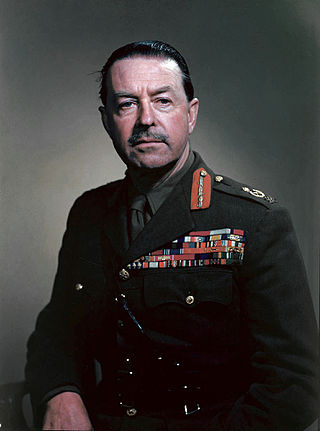
The Alexander Cup was the championship trophy for the Major Series of senior ice hockey in the Canadian Amateur Hockey Association from 1950 to 1954. The trophy was presented by its namesake, the Viscount Alexander as the 17th Governor General of Canada.
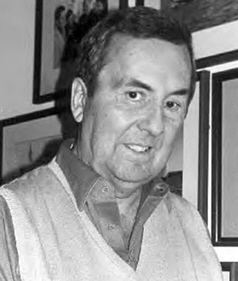
Gordon Ralph Renwick was a Canadian ice hockey administrator, who served as president of the Canadian Amateur Hockey Association (CAHA), vice-president of the International Ice Hockey Federation (IIHF), and was the team president of the Galt Hornets.

William George Hardy was a Canadian professor, writer, and ice hockey administrator. He lectured on the Classics at the University of Alberta from 1922 to 1964, and served as president of the Canadian Authors Association. He was an administrator of Canadian and international ice hockey, and served as president of the Alberta Amateur Hockey Association, the Canadian Amateur Hockey Association (CAHA), the International Ice Hockey Association, and the International Ice Hockey Federation.

Joseph Julius Kryczka was a Canadian ice hockey administrator, coach and referee, and had a legal career as a lawyer and judge, where he was commonly known as "Justice Joe". He graduated from the University of Alberta, and played hockey with the Golden Bears. He practiced law in Calgary for more than 20 years, beginning in 1959 as a lawyer, becoming a judge, and was eventually elevated to a justice on the Court of Queen's Bench of Alberta.
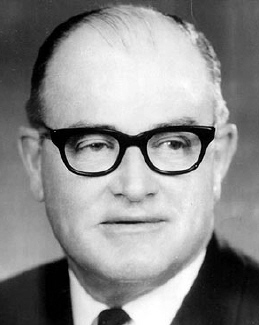
Frank Forest Sargent was a Canadian sports executive in ice hockey and curling. He served as president of the Canadian Amateur Hockey Association (CAHA) from 1942 to 1945, and was president of the Dominion Curling Association (DCA) from 1965 to 1966. He was the first person to be elected to more than two terms as CAHA president, and the first to be president of two national amateur sporting associations in Canada.
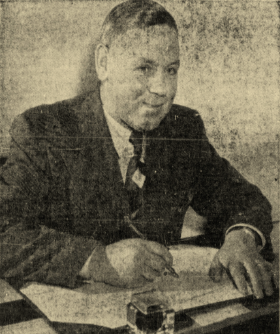
Douglas George Grimston was a Canadian ice hockey administrator who served as president of the Canadian Amateur Hockey Association (CAHA) from 1950 to 1952. He oversaw the establishment of the Major Series for the Alexander Cup and implemented a new deal for player contracts in senior ice hockey, in response to the Allan Cup championship being dominated by a small group of teams who sought to protect themselves from professional leagues recruiting their players. He opposed the National Hockey League wanting its junior ice hockey prospect players on stronger teams, which led to limits on the transfer of players to keep balanced competition for the Memorial Cup. After the 1952 Winter Olympics where the Canada men's national ice hockey team won the gold medal, Grimston recommended withdrawal from Olympic hockey since European nations would never agree to ice hockey rules which allowed physical play. Grimston later accused International Ice Hockey Federation vice-president Bunny Ahearne of financially exploiting of the Edmonton Mercurys on a European tour, which led to a physical altercation between them.
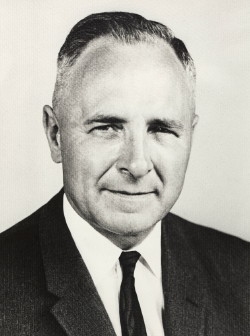
Arthur Thomas Potter was a Canadian ice hockey administrator. He was president of the Canadian Amateur Hockey Association (CAHA) from 1962 to 1964, and oversaw the establishment of a permanent Canada men's national ice hockey team after he decided that sending the reigning Allan Cup champion to international competitions was no longer the answer. He felt that Canada needed discipline to handle Cold War tactics and propaganda at the Ice Hockey World Championships, sought to give its best players to develop as a team, and supported a plan by Father David Bauer to assemble a team of amateur student athletes to complete at the 1964 Winter Olympics.
